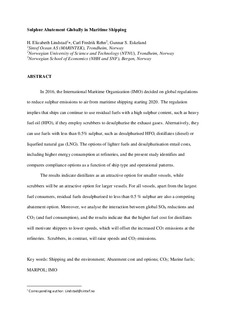Sulphur Abatement Globally in Maritime Shipping
Journal article, Peer reviewed
Accepted version
Permanent lenke
http://hdl.handle.net/11250/2464830Utgivelsesdato
2017Metadata
Vis full innførselSamlinger
- Articles (FOR) [100]
- Publikasjoner fra CRIStin (NHH) [249]
Originalversjon
Transportation Research Part D: Transport and Environment. 2017, 57 303-313.Sammendrag
In 2016, the International Maritime Organization (IMO) decided on global regulations
to reduce sulphur emissions to air from maritime shipping starting 2020. The regulation
implies that ships can continue to use residual fuels with a high sulphur content, such as heavy
fuel oil (HFO), if they employ scrubbers to desulphurise the exhaust gases. Alternatively, they
can use fuels with less than 0.5% sulphur, such as desulphurised HFO, distillates (diesel) or
liquefied natural gas (LNG). The options of lighter fuels and desulphurisation entail costs,
including higher energy consumption at refineries, and the present study identifies and
compares compliance options as a function of ship type and operational patterns.
The results indicate distillates as an attractive option for smaller vessels, while
scrubbers will be an attractive option for larger vessels. For all vessels, apart from the largest
fuel consumers, residual fuels desulphurised to less than 0.5 % sulphur are also a competing
abatement option. Moreover, we analyse the interaction between global SOX reductions and
CO2 (and fuel consumption), and the results indicate that the higher fuel cost for distillates
will motivate shippers to lower speeds, which will offset the increased CO2 emissions at the
refineries. Scrubbers, in contrast, will raise speeds and CO2 emissions.
